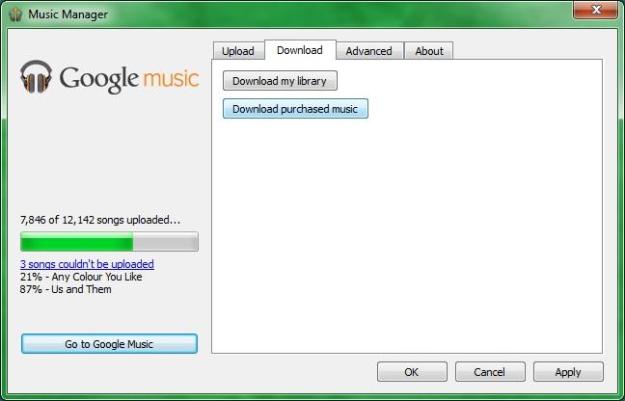
Google Music users, you can breathe a slight sigh of relief, but don’t get too excited. Google has finally enabled a way for you to retrieve the music you upload to its new music storage locker service. The announcement was made on the official Google+ page for Android and verified by a new help article on the Android Market Web site.
Using the Windows or Mac desktop PC client, you can now click one of two options. You can “Download my library” or “Download purchased music.” One of these options presumably downloads only the music you purchased from Google, while the other lets you download all of the music tracks that you have personally uploaded to the service.
A confused cloud
After hearing this news, I tried out the updated app on my Windows 7 machine this morning to mixed results. While it definitely seems to work (it downloads tracks), Google’s new download feature is extremely limited in functionality and its ability to detect which songs are purchased is completely broken. I tried to download only my “purchased music,” thinking that there would be nothing in there except for the few free songs I’ve downloaded on Google Music, but to my surprise, Google Music believes that it now owns a hefty portion of my music library. Hundreds (maybe thousands) of tracks that were ripped from CDs, purchased on Amazon MP3, and given to me by friends are now all labeled as Google Music purchases for no good reason. If this wasn’t frustrating enough, to download music, you can only download all of it. For me, that means I have to download all 7,900 songs I’ve uploaded to Google Music.
There are options to download tracks from http://music.google.com, but you can only download each song or album two times. Yep, two (2) times…forever. If your computer is acting up and you don’t finish a download, well, too bad; you’ll have to use your last download to get your songs. Google announced this limitation for music purchased through Google, but it seems to apply to all music, even the music that you own and have uploaded to Google Music.

This album (above) was purchased and downloaded from AmazonMP3, and uploaded to Google Music. Google has no ownership of it, yet I am only allowed to download it once. If you download an album, but have already downloaded one of the songs on that album twice, that song will be skipped and you will be prompted to use the Music Manager to get the song. That means you’ll have to download thousands of items to get a single song. The Manager does have one good feature: You can choose to download only the songs that were added since your last mass download. This is useful, but we hope Google adds an auto-download feature that automatically downloads tracks to a PC when it’s added to Google Music. Moreover, it should be possible to upload tracks from an Android phone or tablet.
On top of these troubles, Google’s Music Manager uploading has not operated well since launch. The software is a bandwidth hog, even when its upload speeds are dialed down. It seems to upload incredibly slowly, no matter what you do. I’ve been uploading my collection off and on since the service launched in June 2011, and have still only uploaded about 7,900 songs out of 12,000+. I don’t have a particularly slow connection either. I imagine if I let Google Music run straight and kept my computer on at night, it might take about a month to upload my tracks, maybe longer.
Certain track features, like song ratings (1-5 stars) are not pulled in and converted into Google’s Thumbs Up or Thumbs Down system either, meaning hardcore users will have to re-rank their music.
Android pinning problems

To touch on one last issue, the interface of the Google Music app for Android is improved with Android 4.0, but it’s still quite unpolished when compared to the included music players in Windows Phone and iPhone.
Why not charge?
As someone hunting for a cloud music solution, I’d almost prefer that Google offer a paid option for Google Music, which would give me full access to all of my tracks and the freedom to download them where I please, with the option to specify how the files are formatted and such. But for now, I sit and wait.

